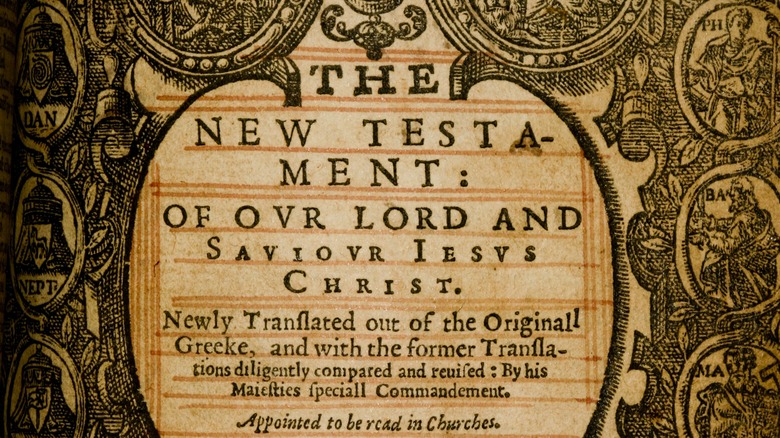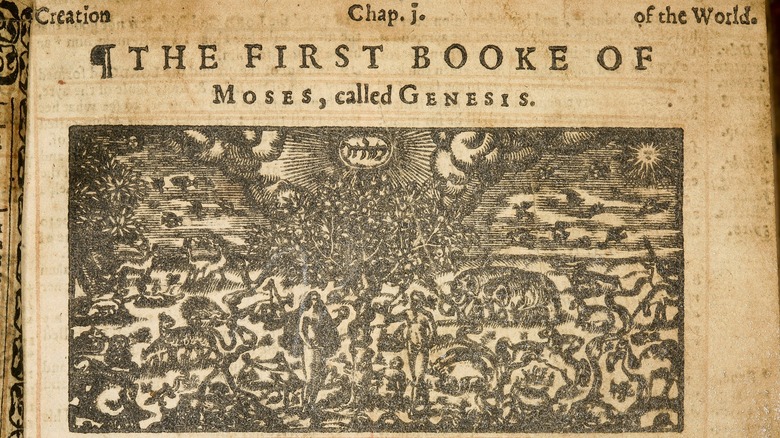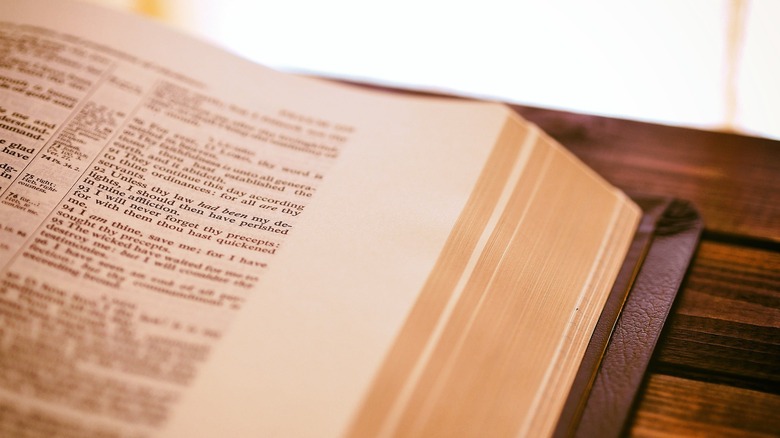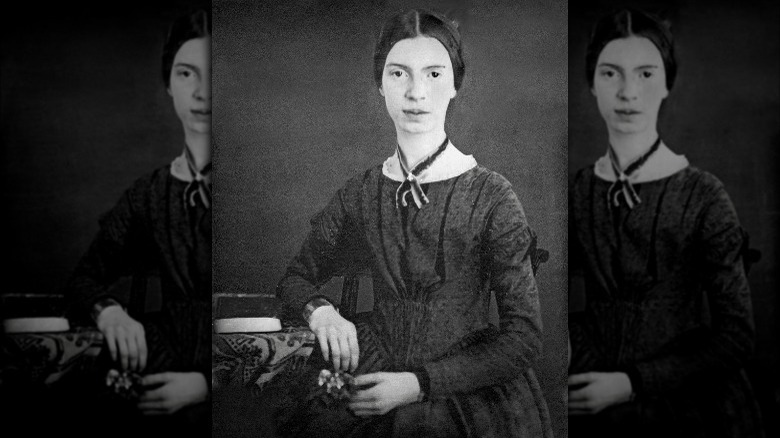The Untold Truth Of The King James Bible
If you happen to be Christian or have attended a Christian church at any point in your life, then you've almost certainly held a Bible in your hands. But what kind of Bible was it, exactly? Of course, you surely already know that these scriptures weren't originally written in English. Researchers now understand that the books of the Bible were first put down in one of three languages: Hebrew, Aramaic, or Greek (via Bible Gateway). Moreover, those languages, at least in the case of Hebrew and Greek, are archaic forms that wouldn't necessarily make sense to modern speakers (imagine trying to understand the Middle English of Geoffrey Chaucer, for instance).
All of this means that translations of the Bible into English or any other language can get pretty tricky. Indeed, the history of English-language Bibles is so fraught that, by the time the King James Version of the Bible debuted in the early 17th century, it was potentially cause for burning people alive. In fact, the kind of Bible you read (and even whether or not you could read it in the first place), could reveal all sorts of information about your personal beliefs, education, political leanings, and whether or not you would consider beheading a monarch.
So, how did the King James Bible, also often referred to as the King James Version (KJV), manage to rise above the fray and become the dominant English translation for centuries? This is the untold truth of the King James Bible.
It didn't exactly start with King James
While the King James Bible now stands out as the granddaddy of English Bible translations, it was far from the first. By the time King James I took the throne of England in 1603 (having already ruled as James VI of Scotland since 1567), quite a few translations had debuted and generated seemingly endless controversy. According to History, these included two especially prominent Bibles: the Geneva Bible, favored by Protestant rabble rousers, and the more church-sanctioned Bishops' Bible. And even seemingly mild differences in translations could cause dramatic and life-altering consequences.
One translator, William Tyndale, became so hopelessly embroiled in Biblical controversy that it cost him both his home and, eventually, his life. According to Britannica, Tyndale was one of the growing group of scholars who thought that the Bible ought to be read by everyone in their own language, making translation key to spreading the word of Christianity.
But his attempts at translation were met with serious resistance, to the point where he had to leave town multiple times. First, he fled to Germany in 1524, where he began publishing his translation of the New Testament and then moved from town to town as he kept releasing new editions. He never finished his Old Testament translation, however, given that he was apprehended in Antwerp, Belgium and strangled, then burned at the stake in 1536. Still, with his translations already circulating in England and beyond, Tyndale's mark had been made.
Henry VIII opened the path to the King James Bible
Plenty of consequential things came about from Henry VIII of England and his intense desire to not only ditch his first wife, Katherine of Aragon, for the upstart Anne Boleyn, but to produce a male heir. The British Library notes that Henry had apparently been getting pretty impatient while waiting on the pope to annul his first marriage to Katherine. When it became clear that the annulment wasn't coming, Henry pushed for the Act of Supremacy, which effectively broke England away from the Catholic Church and established the Church of England. After Parliament signed off on the act in late 1534, Henry was no longer beholden to the pontiff and could go about his divorcing ways unhindered.
The newly minted fact that there was a Church of England also made it clear that its parishioners needed an English-language Bible. The king officially approved a translation in 1539 and it soon became required of every parish in the country to have an English Bible at the ready.
Ironically, reports BBC's History Extra, Henry VIII himself contributed to translator William Tyndale's troubles in the 1520s. When Tyndale was first trying to get his translation of the New Testament published, Henry was still very much a Catholic who wasn't exactly on Tyndale's side. The resistance against the translator, bolstered by the king's then-orthodoxy, was a significant part of Tyndale's decision to flee the country for Germany that decade.
The KJV was originally about keeping power in one place
By the time he made it to the throne of England in 1603, King James I was in a pretty uncomfortable position. He had first been a king of Scotland and, with his foreign ways and accent, worried that he was too alien to his new English subjects. So, as NPR reports, he felt that he needed an especially grand way to establish himself as a ruler. An authoritative and exhaustive new translation of the Bible into English was just what he needed — or so he believed.
James especially didn't like the annotated Geneva Bible, which challenged the idea that kings were ordained to rule by God. Some of these comments even went so far as to refer to kings as "tyrants" and, in an era where being a king came with the very real possibility of losing one's head, that was a serious problem. Plus, with the competition between the Geneva Bible, favored by the Puritans, and the more conformist Bishops' Bible, things weren't exactly peaceful in English religious circles.
So, he commissioned a new Bible translation that would hopefully do away with the quarreling and also those troublesome anti-monarchy notes. And it could well be that, between the refined tastes of the crown and the 47 people tasked with actually translating the scriptures, the group also wanted to lend some poetry to a book whose language had sometimes been ignored in favor of getting the message across.
Creating the King James Bible was a collaborative effort
While it may be tempting to think that the translation of the King James Bible was done by one dedicated person laboring away in a scriptorium or library somewhere, it was actually done by committee. That is, a seriously big committee. James, it seems, wasn't messing around when it came to the pedigree of his namesake translation. All told, it took about 47 scholars to translate the new Bible, which was published in 1611, according to NPR. Of course, there is plenty of evidence that it took quite a long time to get to that finished product. The New York Times reports that one translator's notebook, which covers the years 1604 to 1608, appears to have some of the earliest King James Bible translations yet uncovered.
James also appears to have leaned on his political influence to get different Christian sects to agree on a new translation. Per NPR, before the King James Bible was officially underway, he specifically took both mainline church officials and the more rebellious Puritans and pushed them to work together. Anyone who asked would have been told that it was an attempt to get the two warring groups to reach agreements on things like church procedures. However, James maneuvered the meeting in such a way (like by knocking down the Puritans' suggestions to streamline religious services) that he was able to suggest a new translation of the Bible to make everyone happy.
The King James Bible was also meant to be more accessible
While it may not have necessarily been the foremost concern for James himself and his interest in the divine right of kings, accessibility soon became a primary focus of the emerging Bible translation. Earlier attempts at translation, like those by Willian Tyndale or John Wycliffe's earlier and very illegal 15th century translation (via British Library), were certainly meant to bring the scriptures to a wider audience and circumvent the Latin-speaking monopoly of priests interpreting the Bible for everyone else. But the King James Bible in particular was uniquely situated to bring that word to an even wider audience.
That's in part because of increasingly better printing technology. By the time that the King James Bible was ready to debut, printing presses were sufficiently advanced that copies of the translation were more affordable and easier to find than ever, History reports.
Furthermore, the language of the King James Bible was also a big deal, and not just because it was in English. Instead, translators used a refined and artistic version of English that wasn't just accessible to readers, but also inspired a sense of poetry and grandeur that had been lacking in other versions. It was, for many, a book that contained awe-inspiring language. Other versions, which could be more utilitarian or more focused on making a direct point, simply weren't as gripping for readers as this new version.
The translation may have seriously backfired on the monarchy
With the debut of the King James Bible, though it would be some time until the translation really began to take hold, at least King James himself could rest a little easier knowing that something had been accomplished in his name. Too bad his son couldn't feel the same way.
That's because, despite snipping out those worrisome annotations that could be found in the Geneva Bible and perhaps massaging other translations to be more favorable to rulers, the King James Bible didn't fully quash the anti-royal sentiment. According to History, because the faithful could now more easily read passages for themselves, they happened upon verses that still managed to question the British monarchy and certainly didn't lead the country away from a looming civil war. Consider Deuteronomy 17, which acknowledges the necessity of rulers, but also notes that they need to reign it in, saying that "neither shall he greatly multiply to himself silver and gold." Pretty awkward for the notoriously fancy and oftentimes spendy rulers of Europe.
It's possible that this led to the English Civil War and the execution of James' son, king Charles I. After all, as Brigham Young University notes, the religious tensions that were already bubbling during James' time came to head during Charles' reign. It didn't help that the Geneva Bible was still the preferred version of the increasingly rebellious Puritans, while the King James Bible was increasingly identified with the monarchy-friendly royalists.
It didn't really become popular until the Restoration
Despite all the effort that went into it and the way it's been received in some modern churches, the King James Bible didn't immediately win over legions of adoring fans. Indeed, according to Brigham Young University, the Geneva Bible remained staunchly popular, especially amongst dissenters like the Puritans. This effectively meant that the King James Bible became linked to the royalists. After the English Civil Wars commenced and the Puritan leader Oliver Cromwell prevailed against Charles I (and the monarch's head was removed from his body), the King James Bible quickly fell out of fashion.
Of course, any casual student of English history can tell you that Cromwell's reign as Lord Protector of the Commonwealth didn't last forever. The surviving royals, including King Charles II, made their way back from exile in Europe to recommence their reign. That era, popularly known as the Restoration, began with Charles II's return in 1660, per History Extra. That's when the King James Bible really got going, thanks to the growing support for the monarchy and more official recognition of the translations itself. The translation became increasingly widespread not only at home in Britain, but in the nation's far-flung colonies, too, where it was eventually the standard Bible translation in practically any Christian home or church that spoke English.
The King James Bible has had a profound effect on the English language
Once it got going, the King James Bible started to firmly entrench itself in the very bones of the English language. As the Bible translation grew more and more ubiquitous, many more generations could be found reading and listening to its words.
It's easy to see how the words of the KJV have been found in later works of art. The University of Canterbury notes that the translation directly plays into the famous Handel's "Messiah" oratorio. The librettist, Charles Jennens, who wrote the lyrics for Handel's masterwork, pretty much cribbed directly from the King James Bible. And, as JSTOR Daily reports, the KJV's influence can be felt across the Atlantic in the literary and oral traditions of the Americas, from Abraham Lincoln's speeches to Herman Melville's "Moby-Dick." Emily Dickinson also borrowed the language for her poems and often read her own King James Bible (via Deseret News).
And if that all seems a little distant, you need only look to your own everyday speech, the BBC claims. If you've ever referenced someone's "backslide," called them "the salt of the earth," or sadly reported that they eventually "gave up the ghost," then you've also been referencing the words of the King James Bible. The sometimes-idiosyncratic feel of some phrases — "by the skin of one's teeth," for instance — is due in part to translators directly and literally transposing words from Greek or Hebrew into English.
Other modern Bible translations have entered the competition
While, for a pretty comfortable stretch of history, the King James Bible was comfortably situated as the prime translation of the Bible into English, it's now been joined by a bevy of new translations. Naturally, these new versions have caused their fair share of controversy.
According to the Religious Studies Center at Brigham Young University, the 20th century has seen such an explosion of new English translations that they number into the thousands. Some of the KJV's biggest competitors include the New Revised Standard Version (NRSV), released in 1989 and intended to appeal to a vast swath of different denominations, as well as the New International Version (NIV), an evangelical take on translation that also relied on a team of religious scholars and even style consultants to get the job done. Then, there's the English Standard Version (ESV), one of a few translations that tries to get as close to the original meaning of the text as possible with what its preface calls an "essentially literal" translation of the scriptures.
If that weren't all enough, there's even an update to the King James Bible itself, known, naturally enough, as the New King James Version. Per Britannica, that translation was fully published in 1983 after years of work by a 130-person team of religious leaders and scholars (beat that, King James and your 47 translators). The updated text modernized some spellings while maintaining that poetic structure of many of the original translation's phrasing.
The King James Only movement still claims it has the best translation
While other churches have moved on to different Bible translations like the New International Version or the English Standard Version, some Christian fundamentalist denominations maintain that the King James Bible is the only one that really matters. They argue that the book, as it was released back in the 17th century, is still the best and, for many, the one and only legitimate translation of the Bible into English.
According to "The Oxford Handbook of the Bible in America," the King James Only movement, as it's often called, is a pretty fresh-faced newcomer to the scene, despite the antiquity of its central text. It came about largely in the 20th century, after the wave of new English translations of the Bible started hitting shelves, riling traditionalists who had grown up with the language and imagery of the King James Bible. Proponents of the movement say that the KJV is the best in large part because of its history and long-held authority, which they say is lacking for newer translations.
Some, per "A History of the Bible," even go so far as to say that newer versions attempt to "correct the preserved word of God." This would push translations like the NIV and ESV into potential blasphemy territory, as, in the eyes of many King James only-ists, the KJV is the only perfectly translated Bible from the mouth of God.










